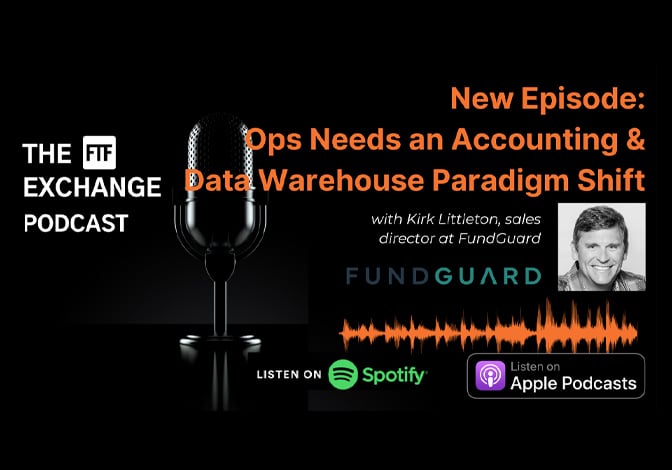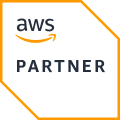

Following is a recap of the FTF Exchange Podcast, featuring FundGuard’s Kirk Littleton, released on February 22, 2024 and now streaming via FTF, Apple and Spotify.
The traditional approach to cross-enterprise investment operations needs an upgrade, and the path starts with investment accounting.
Recently, FundGuard’s Kirk Littleton joined the FTF Exchange Podcast to discuss how digitalization and new technologies are transforming operations at asset management firms. Having started his career in this industry in the early 80s, he has witnessed how the evolution of the space, from increasing pools of asset classes and jurisdictions to regulatory requirements and investor demand has impacted the efficiency and viability of investment operations, particularly legacy investment accounting systems and related processes.
Today, Kirk shares FundGuard’s philosophy that the future of investment operations resides in the cloud — and it would seem the technologies and mindsets in the industry are now finally poised and ready to adapt.
Following is a summary of the viewpoint shared by Kirk during the podcast discussion.
Back in the ‘80s and ‘90s, firms were dealing with a limited number of asset classes and rarely investing globally. The investment accounting systems of the time were centered around those limited asset classes with capabilities tailored only to those specific assets.
However, asset classes have only become more diverse and complex, leading to a need to replace or modify existing platforms and investment accounting systems. This marked the start of ever more segregated accounting systems, which led to evermore segregated data and operational silos, which ultimately gave way to the disparate legacy systems we see causing inefficiencies today across front, middle and back office processes.
In the end, firms have been left with multiple different, disconnected accounting systems, creating a ripple effect on the front office and beginning the age of data warehousing.
To harness the investment accounting data and other information from all these disparate models that have emerged over the years, data warehouses were built with the intent to integrate all the various analytical and operational tasks required across the firm, like performance measurement and client reporting, for example. Yet, this has created an entirely new problem — once data moves from the separate accounting system to the data warehouse, it is almost inevitably already experiencing latency. The result is now another convoluted process of replenishing the outdated data and working to ensure the old data is not used in the meantime.
What firms truly need to prioritize is avoiding moving the data around altogether.
With the advancements in technology we have today, firms can now build a more cohesive investment accounting ecosystem that allows previously disconnected systems to communicate in real-time.
Through the use of APIs, data movement platforms have emerged as a means to gather the data necessary for various processes in the moment (like portfolio management, performance measurement, etc.), rather than having to migrate the data around between different platforms and systems.*
True modernization of an accounting system requires a transformation not only from legacy operating models, but also away from legacy thinking. With the technology available today, there is so much possibility to discover.
There are three vital factors to consider during this modernization process:
Making the decision to move to a fully cloud-native, API-driven system is the first crucial step.
An API-based platform eliminates the batch cycles and underlying jobs necessary to manufacture data, instead enabling real-time processing that supports modern technologies like AI and machine learning (ML). AI and ML are particularly essential to implement, as these models are poised to be the next major game changers in the industry over the next decade.
Today, a lot of the existing investment accounting systems are not designed to support these AI and ML models, inhibiting modern innovation and efficiency.
Multi-asset coverage is arguably the most important aspect of modernization to get off the ground.
To achieve streamlined asset management operations, your investment accounting system needs to support every asset passing through the system. Previously, such a feat could not be accomplished. Thanks to cloud computing technologies, however, it is finally possible to begin building new systems that eliminate the need for different performance engines and diminish reliance on data warehouses.
The third factor that must play a key role in system modernization is the multi-book capability.
A well-designed multi-book accounting system provides your firm with one account with one set of transactions and events capable of generating all the books you need, all while allowing configurable rules that match your exact operational needs.
For example, let’s say you want an IBOR for trading only, an ABOR for calculating NAVs, and a PBOR for maintaining the performance engine.
With a multi-book investment accounting system, these books can all function simultaneously, pulling data from the same central source without having to reconcile changes to the data across different systems and models. The multi-book provides you with the ability to support multiple views of your portfolio all at once, achieving enormous cost savings in the process.
In the not-too-recent-past, the technology simply wasn’t available to achieve a single, multi-asset class, multibook investment accounting system. Today, however, the cloud is enabling a whole new approach to investment accounting.
From a C-Suite perspective, it has taken some time, but mindsets are now changing.
Change agents should be calling for a paradigm shift in how asset management teams view their operational functions.
Becoming cloud-first and, eventually, cloud-only is a vital step towards creating a cohesive data ecosystem that enables greater efficiency across the entire industry.
The more Kirk and our team at FundGuard speak with prospective clients, the more we see the changing attitudes surrounding the cloud and the improvements it provides to investment accounting processes. As financial markets become increasingly complex and interconnected, traditional accounting systems will only continue to struggle to keep pace with the demands of real-time data processing and analysis.
These are especially crucial conversations to have as the threat of cyber attacks continues to rise. Cloud-native solutions often come with robust data integrity and security measures, ensuring that sensitive financial information remains protected from unauthorized access or breaches. Moreover, being cloud-native enables quicker decision-making and more comprehensive risk management strategies.
Whether we’re talking about improving operational efficiency or even just meeting the expectations of modern investment clients, the role of the cloud is cemented in the future of asset management. With the cloud, we can improve data management and ensure business resilience.
“In spite of my current enthusiasm, I am grounded in reality and recognize that an API-first, microservices architecture, and the utilization of Kafka data buses doesn’t necessarily replace the need for data warehouses which still play a role in housing data like ‘gold copy’ security reference data, prices, FX rates, corporate actions, and more.
The challenge and opportunity lie in reimagining data warehouses not as the source of dynamic intra-day data but more static data vaults. This blend of traditional and cutting-edge technologies promises a robust framework for managing investment data, ensuring that while we strive for immediacy and flexibility, we do not compromise on the integrity and reliability of critical financial data.”
At FundGuard, our goal is to modernize investment operations with a new era, cross-industry investment accounting utility capable of unifying your data and processes. FundGuard’s design empowers your firm with a single source of truth – manufactured investment accounting data – that helps you optimize costs and operational efficiency.
With capabilities like multi-book and multi-asset coverage, FundGuard aids you in achieving unparalleled speed, scalability, and continuous improvement. Our team is here to help guide your migration away from legacy technology and toward the cloud-native future.
Book a FundGuard demo today to witness firsthand the power of our investment accounting solution.
About the Author
100 Bishopsgate
18th Floor
London, EC2N 4AG, United Kingdom
Sign up for FundGuard Insights



Your use of information on this site is subject to the terms of our Legal Notice.
Please read our Privacy Policy.